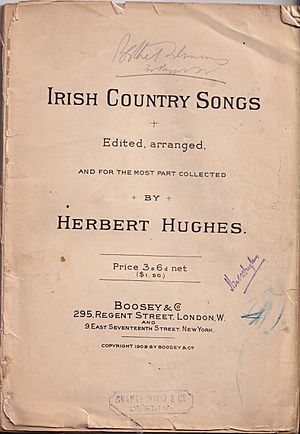Herbert Hughes (composer) facts for kids
Herbert Hughes (born May 16, 1882 – died May 1, 1937) was a talented Irish composer and music critic. He was also very good at finding, collecting, and arranging old Irish folk songs. He was the father of another musician, Spike Hughes.
Contents
About Herbert Hughes
Herbert Hughes grew up in Belfast, Ireland. He later moved to London to study music at the Royal College of Music. He learned from famous teachers like Charles Villiers Stanford and Charles Wood. He finished his studies in 1901. After college, he worked as a music critic, writing about music for The Daily Telegraph newspaper from 1911 to 1932.
When he was just fourteen, Herbert was already an honorary organist at a church in Belfast. In 1903, he started collecting traditional Irish songs in North Donegal with his brother Fred and friends. He loved finding and writing down these old melodies from the quiet valleys of Ulster.
His first collection of these songs was called Songs of Uladh (1904). He worked on this with the poet Joseph Campbell. Throughout his life, Herbert collected and arranged hundreds of traditional tunes. He published many of them in his own special arrangements. Some of his most famous songs are My Lagan Love, She Moved Through the Fair, and Down by the Salley Gardens. These were part of his four collections called Irish Country Songs, which was a big achievement for him. He worked with poets like Joseph Campbell, Padraic Colum, and Yeats on these songs.
Herbert was married to Lillian Florence (known as Meena) Meacham and Suzanne McKernan. He had three children: Patrick (who became known as Spike Hughes), Angela, and Helena. He passed away in Brighton, England, when he was 54 years old.
Herbert's Music Style
Herbert Hughes had a special way of arranging Irish traditional music. He was inspired by the French composer Claude Debussy. Debussy was known for his "impressionist" music, which focused on creating moods and atmospheres rather than strict rules. Herbert believed that music was becoming freer from old rules. He felt that modern French music, especially Debussy's, was helping music return to more natural, "primitive scales."
Herbert thought that arranging songs was just as important as writing new ones. He believed that when an arranger worked on a folk song, they could turn it into a new "art-song" for their own time. His folk song arrangements became popular all over the world where English is spoken. Famous singers like John McCormack and Kathleen Ferrier were among the first to record his songs.
Herbert also admired the poetry of James Joyce. In 1933, he edited a special book called The Joyce-Book. This book featured 13 pieces of music by 13 different composers, all based on Joyce's poems. Herbert himself contributed to the book, along with other composers like Arnold Bax and Albert Roussel. This large, blue book has become a valuable item for collectors.
Besides his arrangements, Herbert also composed some original music. He wrote a small amount of chamber music (music for a few instruments), and some scores for plays and movies. He also worked with John Robert Monsell to create songs for a musical version of a play called The Rivals. This musical, named Rivals!, was performed in London in 1935 and had 86 shows.
Selected Works
Folksong Arrangements
- Songs of Uladh (Belfast, 1904)
- Irish Country Songs, four volumes (London, 1909, 1915, 1934, 1936)
- Historical Songs and Ballads of Ireland (London, 1922)
- Old Irish Melodies (London, 1931)
Original Compositions
Vocal
- She Weeps over Rahoon (James Joyce) for voice and piano (London, 1933, in The Joyce-Book)
- Choral works like Two Old Testament Spirituals, Boreens of Derry, Christmas Time, Doctor Foster
Instrumental
- Three Impressions for Wind Quintet (no date given)
- Three Moods for Brass Quartet (no date given)
Selected Recordings
- The Last Rose of Summer. Best Loved Songs of Ireland, performed by Ann Murray (mezzo-soprano) and Graham Johnson (piano), on: Hyperion CDA 66627 (1993); re-issued as CDH 55210 (2005). This album includes some of Herbert's songs like The Leprehaun; I Have a Bonnet Trimmed with Blue; A Young Maid Stood in her Father's Garden; The Next Market Day; The Bard of Armagh; Monday, Tuesday; The Stuttering Lovers; I Will Walk with my Love; The Cork Leg.
- A Purse of Gold. Irish Songs by Herbert Hughes, performed by Ailish Tynan (soprano) and Iain Burnside (piano), on: Signum Classics SIG CD 106 (2007). This recording features many of his arrangements, such as Reynardine; The Fanaid Grove; The Leprehaun; When through Life unblest we Rove; Oh, Breath not his Name; I'm a Decent Good Irish Body; She Weeps over Rahoon; The Magpie's Nest; Johnny Doyle; Cruckhaun Finn; Johnny I Hardly Knew Ye; The Gartan Mother's Lullaby; You Couldn't Stop a Lover; I Will Walk with my Love; She Moved thro' the Fair; The Bard of Armagh; The Old Turf Fire; O Father, Father, Build me a Boat; B for Blarney; She Lived beside the Anner; The Stuttering Lovers; I Know where I'm Goin'; A Young Maid Stood in her Father's Garden; The Spanish Lady; Tigaree torum orum.
- The Leprechaun, with Frederica von Stade (mezzo-soprano) and Martin Katz (piano), CBS, 1982
 | Toni Morrison |
 | Barack Obama |
 | Martin Luther King Jr. |
 | Ralph Bunche |


